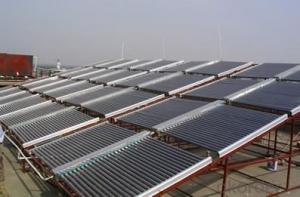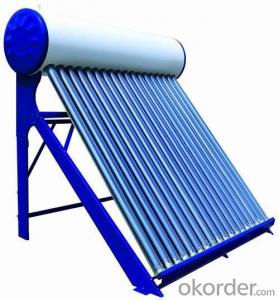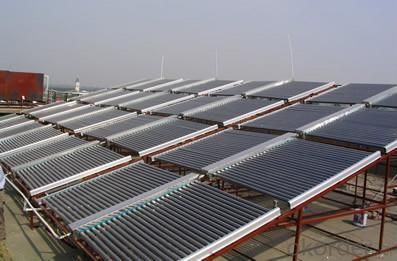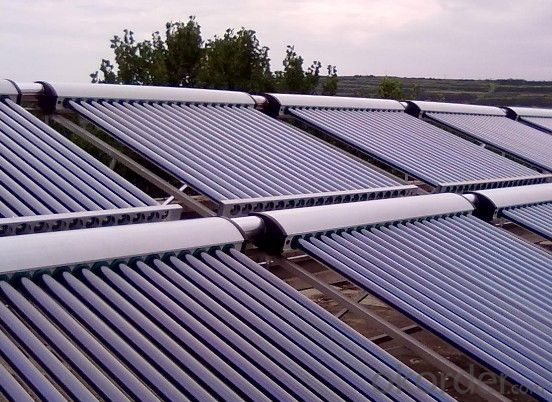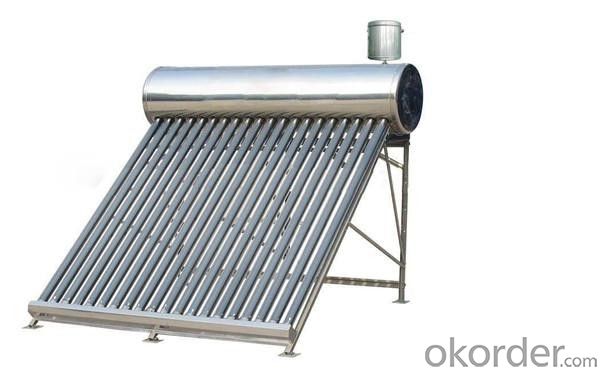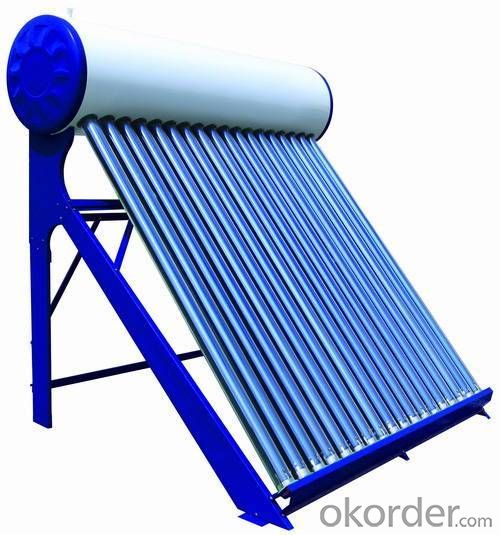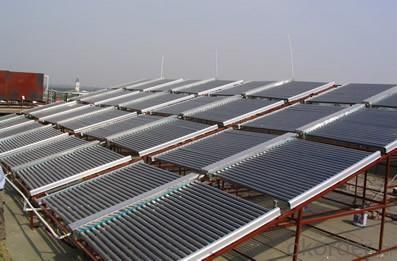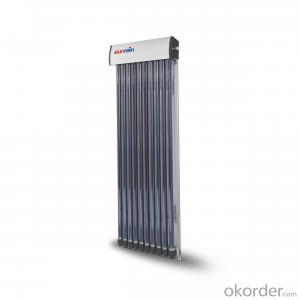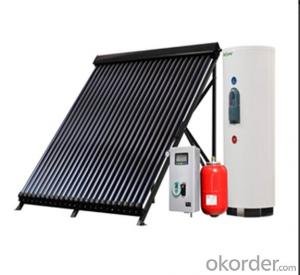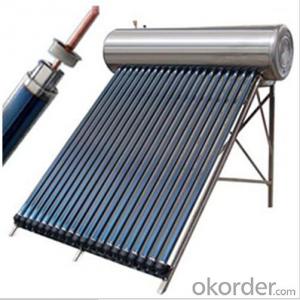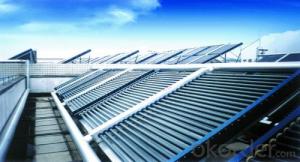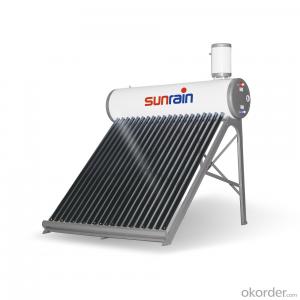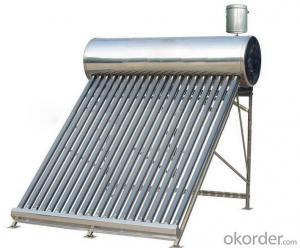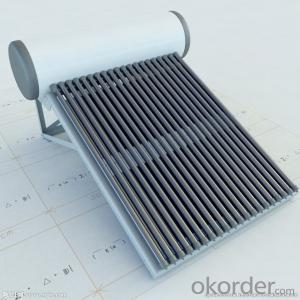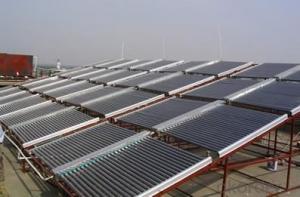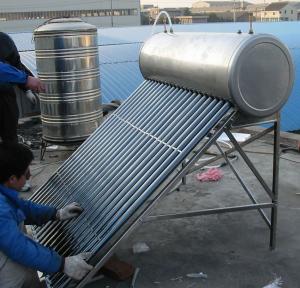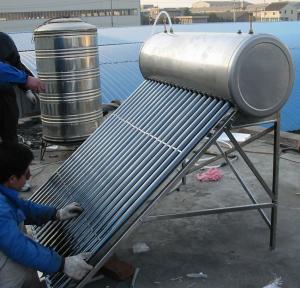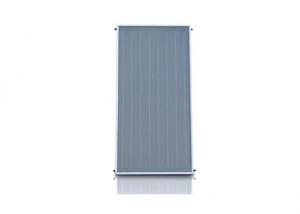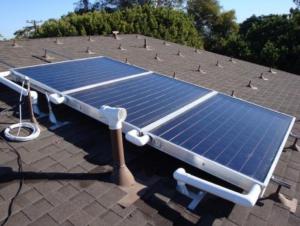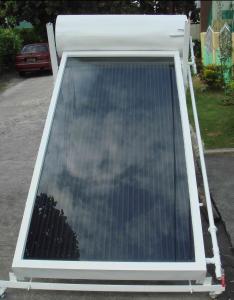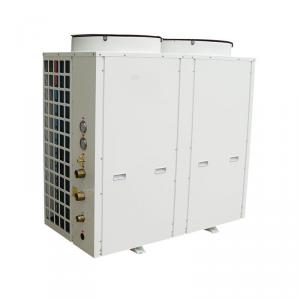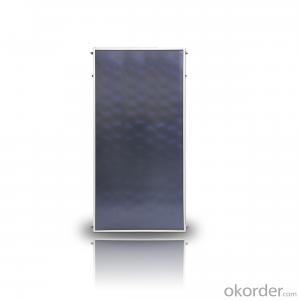20tube Non-Pressure Solar Water Heater Collector - Solar Water Heater Hawaii
- Loading Port:
- China main port
- Payment Terms:
- TT OR LC
- Min Order Qty:
- 10 set
- Supply Capability:
- 10000 set/month
OKorder Service Pledge
OKorder Financial Service
You Might Also Like
Solar water heaters features
1. The upright tank can make the water temperature to a high level. It can hot the water instantly
2. The tank inside the building, the hot water loses less energy than the normal one
3. The solar collector and the tank of solar water heater is separated, that makes the system combine with the building perfectly, which will reduce the sightseeing for the building and environment around
4. Back up with electric heater so that in the day without sunshine hot water can also be used
5. Can be combined with gas or electric heater
6. Max. Pressure: 12bar; Operating Pressure: 6 bar
7. It can be used for other function, such as warming
Solar water heaters working principle
1. The solar collector absorbs solar energy and transmits it to the solar water heater tank through circulation
2. When the temperature of the collector reaches the set value, the controller starts the circulation pump automatically
3. The circulation pump makes heat-conducting liquid circulate automatically
4. The heat-conducting liquid transfers heat to water by lower heat exchanger in the water tank.
5. When the temperature difference between solar collector and heat pipe solar water heaters tank doesn't reach the set value, the circulation pump will be shut automatically
6. In case the temperature of the water tank does not reach Tmax, Electric Heating Element will start to work automatically
Solar water heaters working station component:
1. Operating screen
2. Manometer
3. Pump speed adjust switches
4. Temperature difference circulation pump
5. Flow rate indicator
6. Return circuit connector
7. Safety valve
8. Expansion vessel connector9. Return circuit connector
10. Wall mounting
11. Expansion vessel:8L
12. Pressure resistance: 10 bar pressure for expansion vessel
Solar water heaters specification:
Description | solar water heaters |
Material of out manifold | 0.55mm thickness color steel/ fluorine carbon steel |
Material of inner tank | Food grade 2.0 mm thickness SUS304 stainless steel |
Tank insulating layer | 40mm 45kg/m³ high-density polyurethane foamed |
Inlet and outlet hole | Male G1'' |
Max pressure | 0.6 Mpa |
Solar collector tube | 3.3 Borosilicate glass with N/Al coating |
Thickness of glass tube | 1.6mm |
Vacuum tube tightness | P≤0.005 Pa |
Absorption | as=0.93-0.96 (AM1.5) |
Emission ratio | εh=0.04-0.06 (80C±5C) |
Idle sunning property parameters | Y=220~260m2.C/KW |
Average heat loss coefficient | ULT=0.6~0.7W/(m2.C) |
Bracket: | 2.0mm thickness aluminum alloy |
Tank weight | 75KGS |
Tank size | 560mm Dia x 1810mm Height |
Tank capacity | 300L |
Solar collector | 2pcs 58x1800x15tube solar collector |
Absorber area | 2.811 m² |
Working station | SP116 working station |
Heat exchanger length | Upper:12m, Underside:18m |
Solar water heaters details show:
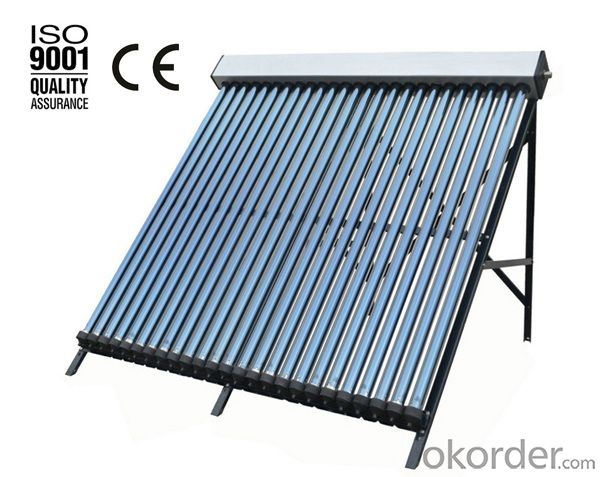
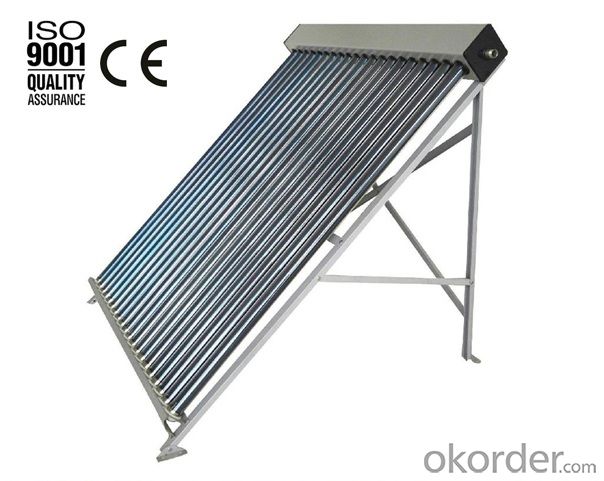
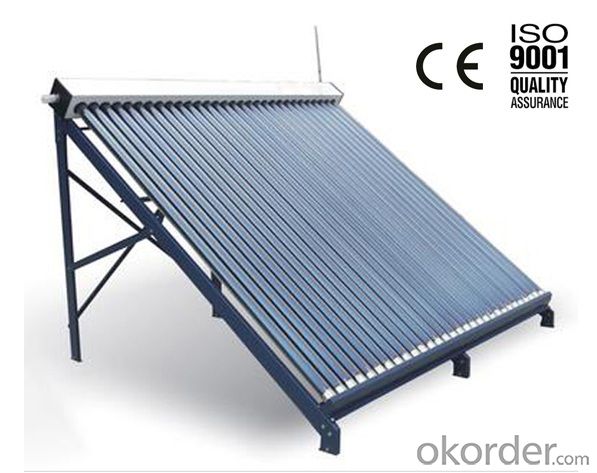
Benefits of this kind of solar water heaters:
1. Prolong the life of your existing water heater
2.Costs less than an electric, gas or oil water heater
3.No maintenance required
4.Lasts longer than a traditional hot water heater
5.Reduce your water heating costs
- Q: Can a solar water heater be used in areas with limited geothermal resources?
- Yes, a solar water heater can be used in areas with limited geothermal resources. Solar water heaters rely on the energy from the sun to heat water, rather than geothermal energy from the Earth's core. Therefore, the availability of geothermal resources does not impact the functionality or efficiency of a solar water heater. As long as there is sufficient sunlight, a solar water heater can be used effectively to heat water in areas with limited geothermal resources. Additionally, solar water heaters are a sustainable and environmentally friendly alternative to traditional water heating methods, as they reduce reliance on fossil fuels and lower greenhouse gas emissions.
- Q: Are there any limitations to using a solar water heater?
- Yes, there are a few limitations to using a solar water heater. Firstly, solar water heaters are dependent on sunlight, so they may not be as effective in regions with limited sunlight or during cloudy periods. Additionally, solar water heaters require a larger upfront investment compared to traditional water heaters, although they can result in long-term cost savings. Lastly, the size and placement of solar panels may pose constraints for installation, especially in areas with limited roof space or shaded areas.
- Q: What is the expected performance of a solar water heater in areas with high levels of air pollution from vehicles?
- The expected performance of a solar water heater in areas with high levels of air pollution from vehicles may be slightly reduced compared to areas with cleaner air. The air pollution can potentially block some sunlight from reaching the solar panels, reducing their efficiency in converting sunlight into heat energy. However, the overall impact on performance will depend on the severity and frequency of pollution episodes, as well as the maintenance and cleaning practices of the solar water heater. Regular cleaning and maintenance can help mitigate the effects of air pollution on the system's performance.
- Q: Can a solar water heater be installed without a storage tank?
- No, a solar water heater cannot be installed without a storage tank. The storage tank is a crucial component that allows for the collection and storage of heated water from the solar panels. Without a storage tank, the system would not be able to store and distribute hot water effectively.
- Q: How does a solar water heater perform in areas with high levels of rainfall?
- Despite high levels of rainfall, a solar water heater can still function effectively, although its performance may be slightly diminished compared to sunnier areas. The functionality of a solar water heater is not completely hindered by rainfall, as it primarily relies on the sun's energy for heating water. In regions with abundant rainfall, the solar water heater may receive less direct sunlight due to clouds, which can impact its efficiency. However, the system can still absorb available solar radiation, even on cloudy days, and convert it into heat energy to warm the water. It is important to note that solar water heaters are designed to operate in various weather conditions, including rain. While their efficiency may vary, they can still provide a significant amount of hot water. Moreover, many solar water heaters are equipped with backup heating mechanisms, such as electric or gas heaters, to ensure hot water availability during extended periods of cloudy or rainy weather. To optimize the performance of a solar water heater in rainy areas, it is advisable to install the system in a location that receives maximum sunlight and is free from obstructions. Regular maintenance, such as keeping the collectors clean and debris-free, can also help maximize the system's performance. In summary, although a solar water heater's performance may be slightly affected in areas with high rainfall, it can still effectively provide hot water. Its efficiency may be lower on cloudy or rainy days, but it remains a cost-effective and environmentally friendly option for water heating, even in regions with adverse weather conditions.
- Q: Does a solar water heater require a backup heating system?
- Yes, a solar water heater may require a backup heating system in order to provide hot water during periods of low solar radiation or when the demand for hot water exceeds the system's capacity.
- Q: How to control the temperature of solar water heater
- The temperature of the solar water heater is irradiated by sunlight and heat pipe increased. If the solar water heater to fill your home water, on a sunny day, the water temperature can only be more and more high; if it is a rainy day, is likely to remain unchanged, but generally not low; but very cold winter rainy days may reduce.
- Q: Solar water heater power consumption?
- If you encounter rainy weather, the water temperature in the tank is not high, and then electricity heating, when the water temperature reached 42 degrees or so you can take a bath.Solar water heater tank electric heater power is generally 1500 watts, continuous heating electricity for an hour power consumption of 1.5 degrees.
- Q: How does a solar water heater affect water quality?
- Water quality can be improved by using a solar water heater. Unlike traditional water heaters that rely on fossil fuels, solar water heaters utilize the sun's energy to heat water. This results in the absence of emissions or pollutants during operation. Consequently, the water warmed by a solar water heater remains untainted by harmful substances like carbon monoxide or sulfur dioxide, which can have adverse effects on water quality. Moreover, electricity is unnecessary for solar water heaters, which lessens the demand for power plants to generate electricity. Since power plants often utilize water sources for cooling, the discharge of warm water back into these sources can elevate their temperature and negatively impact aquatic life. By implementing solar water heaters, the requirement for electricity decreases, thereby reducing the necessity for water-intensive cooling processes and minimizing potential harm to water ecosystems. Additionally, solar water heaters lack storage tanks, resulting in water being heated directly as it passes through the system. This diminishes the likelihood of bacterial growth and sediment accumulation, both of which can compromise water quality. The absence of storage tanks also eliminates the possibility of corrosion or rusting, which could contaminate the water. In conclusion, a solar water heater positively influences water quality by avoiding the release of pollutants, diminishing the need for water-intensive cooling processes, and minimizing the risks of bacterial growth and contamination.
- Q: How does the water quality of a solar water heater compare to a traditional water heating system?
- The water quality of a solar water heater is generally similar to that of a traditional water heating system. Both systems rely on the same water supply and undergo similar treatment processes, such as filtration and disinfection. However, solar water heaters have an advantage as they do not require the use of fossil fuels, which reduces the risk of potential contamination from combustion byproducts. Therefore, in terms of water quality, solar water heaters are a cleaner and more environmentally friendly option compared to traditional water heating systems.
Send your message to us
20tube Non-Pressure Solar Water Heater Collector - Solar Water Heater Hawaii
- Loading Port:
- China main port
- Payment Terms:
- TT OR LC
- Min Order Qty:
- 10 set
- Supply Capability:
- 10000 set/month
OKorder Service Pledge
OKorder Financial Service
Similar products
Hot products
Hot Searches
Related keywords
